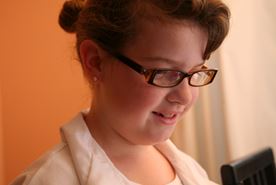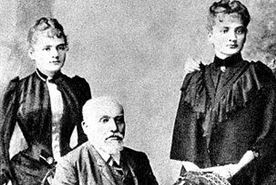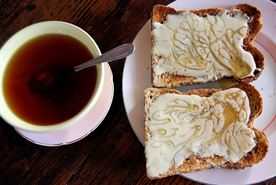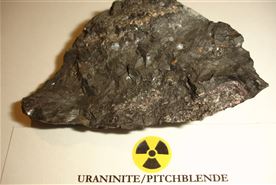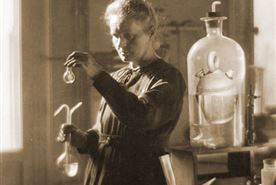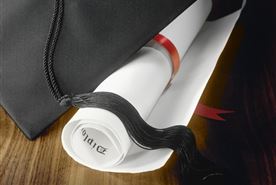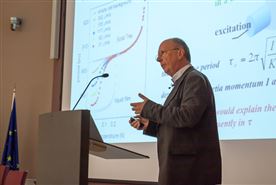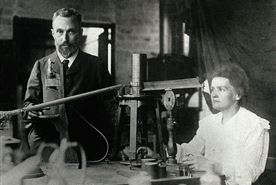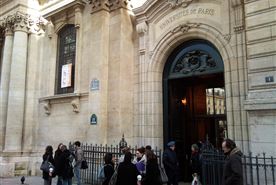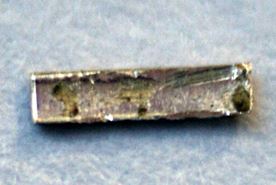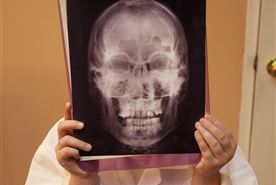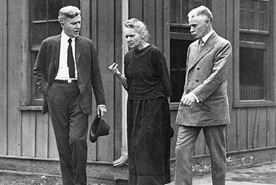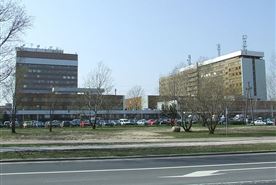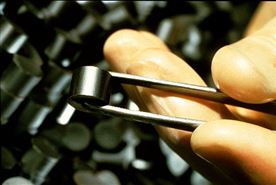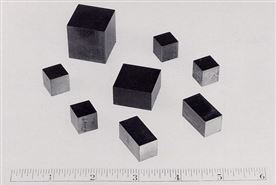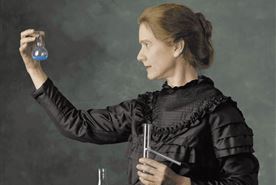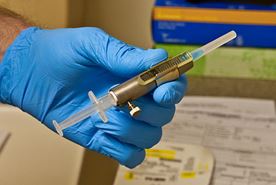YOLA 12A: The Life and Work of Marie Curie - all
Noun
a powerful and dangerous form of energy
radioactivity
Marie Curie is probably the most famous woman scientist who has ever lived. Born Maria Sklodowska in Poland in 1867, she is famous for her work on radioactivity, and was twice a winner of the Nobel Prize.
Marie Curie is probably the most famous woman scientist who has ever lived. Born Maria Sklodowska in Poland in 1867, she is famous for her work on radioactivity, and was twice a winner of the Nobel Prize.
Adjective
very impressive
prodigious
From childhood, Marie was remarkable for her prodigious memory, and at the age of 16 won a gold medal on completion of her secondary education.
From childhood, Marie was remarkable for her prodigious memory, and at the age of 16 won a gold medal on completion of her secondary education.
Noun
the act of using money to earn more money
investment
Because her father lost his savings through bad investment, Marie then had to take work as a teacher.
Because her father lost his savings through bad investment, Marie then had to take work as a teacher.
Phrase
to have (a particular food) as the only or main food that you eat
lived on
In 1891 this promise was fulfilled and Marie went to Paris and began to study at the Sorbonne (the University of Paris). She often worked far into the night and lived on little more than bread and butter and tea.
In 1891 this promise was fulfilled and Marie went to Paris and began to study at the Sorbonne (the University of Paris). She often worked far into the night and lived on little more than bread and butter and tea.
Noun
sciences that deal with the nature and properties of energy and nonliving matter
physical sciences
She came first in the examination in the physical sciences in 1893, and in 1894 placed 2nd in the examination in mathematical sciences. It was not until the spring of that year that she was introduced to Pierre Curie.
She came first in the examination in the physical sciences in 1893, and in 1894 placed 2nd in the examination in mathematical sciences. It was not until the spring of that year that she was introduced to Pierre Curie.
Noun
a fact or situation that is observed to exist or happen
phenomenon
Their marriage in 1895 marked the start of a partnership that was soon to achieve results of world significance following Henri Becquerel's discovery in 1896 of a new phenomenon, which Marie later called 'radioactivity'.
Their marriage in 1895 marked the start of a partnership that was soon to achieve results of world significance following Henri Becquerel's discovery in 1896 of a new phenomenon, which Marie later called 'radioactivity'.
Verb
to give or apply one's time and attention to a particular activity
devoted
While Pierre devoted himself to the physical study of the new radiations, Marie struggled to obtain pure radium in the metallic state. This was achieved with the help of the chemist Andre-Louis Debierne, Pierre's pupil.
While Pierre devoted himself to the physical study of the new radiations, Marie struggled to obtain pure radium in the metallic state. This was achieved with the help of the chemist Andre-Louis Debierne, Pierre's pupil.
Noun
a time when an important change happens
turning point
The sudden death of her husband in 1906 was a bitter blow to Marie Curie, but was also a turning point in her career: henceforth she devoted all her energy to completing alone the scientific work that they had undertaken.
The sudden death of her husband in 1906 was a bitter blow to Marie Curie, but was also a turning point in her career: henceforth she devoted all her energy to completing alone the scientific work that they had undertaken.
Phrase
with a purposeful or sincere intent
in earnest
In 1918, the Radium Institute, whose staff Irene had joined, began to operate in earnest, and became a centre for nuclear physics and chemistry.
In 1918, the Radium Institute, whose staff Irene had joined, began to operate in earnest, and became a centre for nuclear physics and chemistry.
Noun
the ability to be used for practical purposes
applications
Marie Curie, now at the highest point of her fame and; from 1922, a member of the Academy of Medicine, researched the chemistry of radioactive substances and their medical applications.
Marie Curie, now at the highest point of her fame and; from 1922, a member of the Academy of Medicine, researched the chemistry of radioactive substances and their medical applications.
Noun
the act of celebrating the fact that something is officially ready to be used
inauguration
Marie gave lectures around the world and, in addition, witnessed the development of the Curie Foundation in Paris and the inauguration in 1932 in Warsaw of the Radium Institute, where her sister Bronia became director.
Marie gave lectures around the world and, in addition, witnessed the development of the Curie Foundation in Paris and the inauguration in 1932 in Warsaw of the Radium Institute, where her sister Bronia became director.
Verb
to gather or acquire something gradually as time passes
accumulate
One of Marie Curie's outstanding achievements was to have understood the need to accumulate intense radioactive sources.
One of Marie Curie's outstanding achievements was to have understood the need to accumulate intense radioactive sources.


